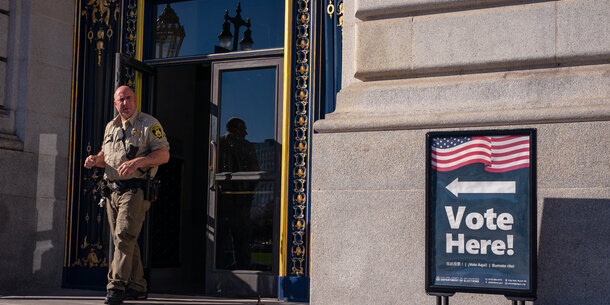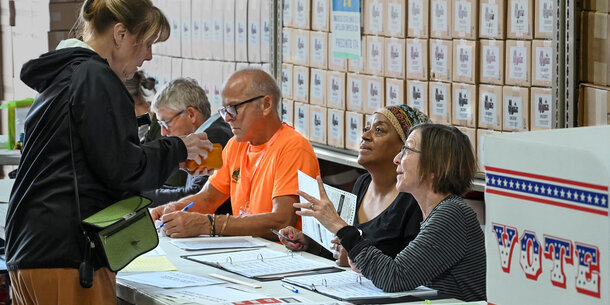Let’s take a deep breath, celebrate the remarkable feat of running a smooth election in a pandemic, and defend the system in the face of those who would shut it down.
In a sense, we are just where we expected to be a month ago. A big turnout. A big likely win for Joe Biden in the total vote. And — because of misguided state laws, which legislators refused to change — a delayed counting process in Michigan, Wisconsin, and Pennsylvania. We knew we would have to wait, possibly until Friday, as officials count the vote. And so we shall.
Election officials from both parties are rightly being hailed as heroes of this phase of the pandemic. Over many months, they worked to expand vote by mail so it was available to many more people. They expanded early voting. They worked to establish safe polling places. Kudos, too, to the businesses that stepped up, from providing PPE to opening the doors of downtown arenas. Thank you to the hundreds of thousands of new poll workers who kept things running.
By all accounts, the 2020 election was fair and clean. There is no evidence of misconduct, or fraud, or chicanery. No doubt you will start to hear those claims. They’ll be spread on social media, by foreign bots and far-right chat groups, and may quickly migrate into mainstream circles. This morning I was on a television panel with a Republican consultant who said that in the “inner cities,” there’s massive voter fraud. The racial coding there is not exactly subtle. These claims are concocted. Don’t fall for them.
Now, of course, there’s a threat to the orderly counting of votes, and it comes from a dismayingly familiar source. At 2:30 a.m. President Trump did what he was long rumored to have been planning, which is to declare the whole election a “major fraud on our nation” and demand that the counting stop. Trump’s flop sweat was palpable.
As a former presidential speechwriter, I am very familiar with the genre of election night speeches. (I even helped to write one.) Let’s just say that there’s never been one like that before.
Trump’s lawyers will push some radical legal theories. They claim that state constitutions as interpreted by their courts don’t govern state elections. Or that election officials are not allowed to take steps to make it easier to vote, even in a pandemic. Or they cite, wait for it, Bush v. Gore. Trump has said he wants to take it to the Supreme Court. The Brennan Center is getting ready to be part of that legal debate. Do the courts really want to upend the election laws and policies of all 50 states?
These court cases are important and interesting. But they will not decide the election. Courts won’t choose the next president. Voters did. And it’s an inspiring thing to see.
While we may not yet know the winner, here’s what we know:
Tuesday was a major chapter in the long history of America’s drive to build a truly representative democracy and a more perfect union. Despite a raging pandemic and relentless attempts to undermine faith in the election and our democracy, more than 100 million Americans voted early — an unprecedented feat during a health crisis that has killed more than 230,000 Americans.
The intimidation that we feared at polling places, for the most part, did not happen. Violence, thankfully, nonexistent. Instead, election officials were prepared. Polling locations were well-stocked and able to deploy the backup procedures they had in place to keep people voting when technology failed. The poll worker shortage we feared did not happen, thanks to the thousands who heroically stepped up to help Americans vote. Young people turned out in record numbers. It was a proud day for our democracy and the unsung heroes who made this election possible.
But once again, the deficiencies in our electoral system cannot be ignored.
Voter suppression played its ugly role again this year. Polling place closures, purges of voter lists, and more were allowed after the Supreme Court gutted the Voting Rights Act in Shelby County in 2013. In Florida, hundreds of thousands of citizens with past felony convictions regained the right to vote through Amendment 4 in 2018. Then the legislature stripped them of that right, with the blessing of a federal appeals court. These would-be voters, disproportionately Black men, were again barred from voting because of a poll tax.
It appears that Biden will win the total popular vote by millions — likely much more than Clinton’s lead in 2016. If Trump does win, he’ll be the first president to win a second term and lose the popular vote twice. Now, all eyes are on the Electoral College — a profoundly archaic and undemocratic institution with racist roots. Note that Democrats will have won the popular vote in seven of the past eight presidential races, yet Republicans will have chosen two-thirds of the Supreme Court. That kind of minority entrenchment can’t last long without a crisis of legitimacy.
Worth noting, there has been some decisive good news. California passed Prop 17, which will restore voting rights to nearly 50,000 people who have completed their prison sentences. The results of other key criminal justice ballot measures will have far-reaching, positive effects in states such as Michigan, Washington, and Kentucky. And in Virginia, nonpartisan redistricting reform was enacted by voters.
Patience isn’t necessarily an American virtue, but this week, it’s a necessity. For now, we wait. Election officials will do their jobs, and when all is said and done, it will be the American people who choose the next president.



